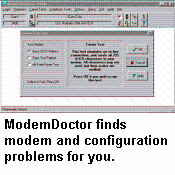 | | Communication Systems News from around the web Did you try the Windows Update? (4-15-2014)I updated two of my machines to patches mentioned below. Both machines continued to have issues with Wireless N/G networks but are working fine when only on an N network alone. I guess we will have to wait a bit longer for a fix. If you have had success or any other suggestions, drop me a note at modemdoctor@modemdoctor.com.Windows 8.1 Update due to be released April 8th (4-3-2014)Microsoft is releasing what is called "update 1" for Windows 8.1. Unfortunately I did not see any mention of repairing the wireless issue that has been documented on so many forums including Microsoft's and others. The update is supposed to include "keyboard friendly" updates and more mouse controls. This should help people who bought new computers but did not pay for touch screens. Without a touchscreen, it can be challenging to navigate the interface. WPCentral's website has additonal information. Click here for that article. A truce with Windows 8.1 and 802.11n (3-26-2014)I found a way to solve my low speed and lockup issues with wifi on my Windows 8.1 machines. Click on the News Feed and select Latest News Article.More on Using Modems for Home (3-13-2014)Did you know that many ISP's offer a backdoor dial-up solution that can be used in the event your broadband connection goes out? If you live in an area where you seem to lose broadband a lot, your only other option to dialup would be an expensive 4G mobile hot spot. Before you spring for one, check out national ISP's that offer both services. Some are bundled quite affordably.Remote into your home (3-12-2014)If you have a computer you need to remotely access, it may seem old-fashioned, but the most secure way to log in is via a modem. Modems are point-to-point devices and for most basic access things around the home the speed is fine. Modem's don't work for large files or streaming video, but to check security systems, thermostats and other network enabled devices, its pretty easy to use a gateway remote access serve and keep others from hacking your network. if you are interested in how to do this, I'll put instructions up on-line.Cable Modem's keep disconnecting (3-10-2014)If you have a cable modem and keep going into ranging mode (lights flash, no internet) you might have a signal level problem. Most cable modems are fed off a splitter that feeds TV's, DVR's and other devices that use cable. If that splitter is too lossy, it will lower your signal too low to be reliable, even though your TV and other devices seem to be working OK.Best thing, take the feed coming in, split it with one feed going right to the cable modem. Then, if you need to split for your other devices, add your splitters here. Also stay away from the 1-to-4 or 6 splitters and use 1 to 2's instead. The 1 to 2's drop the signal 3 db, while the other can be 6 DB down or more. What if you have no serial ports? (3-10-2014)Many of the newer computers do not have serial ports, yet so much legacy gear does. Fortunately, you can easily find USB to Serial Converters on teh web. Most are in the $9-$15 range and can transfer up to about 200 kbps. Since most modems and serial devices usually only work up to about 115.2 kbps, you probably can make one of these work. Personal note- Sometimes I've had problems configuring the correct IRQ's. Make sure whatever unit you purchase has the ability to use any available IRQ.Windows 8.1 Wireless Problem (3-7-2014)Have you updated to Windows 8.1 and had issues where your wireless connection either drops to very slow speeds or disconnects? From a lot of playing around and reading articles on the web, it appears the issue is created when connecting to single band Wireless-N routers. N connectivity is achieved by stacking channels, creating 40 mhz wide channels. This apparenty locks up the drivers. If you go to advanced properties and reset to use only 20mhz wide channels, you will stay connected. However you will not get N speeds. You will be limited to G speeds only, but that's better in my opinion than locking up. I have heard that the issue does not happen on dual band routers, but I've not checked that out yet.Check your WiFi channels for interference (3-7-2014)I must have 15 wireless routers right around my home. Although these systems are pretty robust, it is a bad idea to operate on the same channel as your neighbor. The best channels to be on are either Channel 1 or Channel 11. All others have some degree of overlap, and most wifi routers ship on Channel 6 by default. If you can't tell which channel your neighbors are on, look around the web for wireless tools that will help you find who is on what channel in your area.Wireless Phones and WiFi TIP (3-7-2014)You may not realize, but some home wireless phones operate on frequencies used by your typical wireless router. If you are on-line and suddenly lose connections when someone gets on your house phone, this may be your issue. |